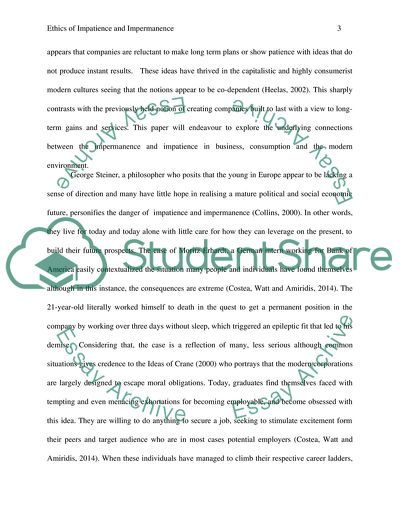Cite this document
(Ethics of Impatience and Impermanence Essay Example | Topics and Well Written Essays - 2500 words, n.d.)
Ethics of Impatience and Impermanence Essay Example | Topics and Well Written Essays - 2500 words. https://studentshare.org/sociology/1855344-explain-and-illustrate-the-relationship-between-the-ethics-of-impatience-and-impermanence-in-business-and-consumption-and-the-natural-environment
Ethics of Impatience and Impermanence Essay Example | Topics and Well Written Essays - 2500 words. https://studentshare.org/sociology/1855344-explain-and-illustrate-the-relationship-between-the-ethics-of-impatience-and-impermanence-in-business-and-consumption-and-the-natural-environment
(Ethics of Impatience and Impermanence Essay Example | Topics and Well Written Essays - 2500 Words)
Ethics of Impatience and Impermanence Essay Example | Topics and Well Written Essays - 2500 Words. https://studentshare.org/sociology/1855344-explain-and-illustrate-the-relationship-between-the-ethics-of-impatience-and-impermanence-in-business-and-consumption-and-the-natural-environment.
Ethics of Impatience and Impermanence Essay Example | Topics and Well Written Essays - 2500 Words. https://studentshare.org/sociology/1855344-explain-and-illustrate-the-relationship-between-the-ethics-of-impatience-and-impermanence-in-business-and-consumption-and-the-natural-environment.
“Ethics of Impatience and Impermanence Essay Example | Topics and Well Written Essays - 2500 Words”. https://studentshare.org/sociology/1855344-explain-and-illustrate-the-relationship-between-the-ethics-of-impatience-and-impermanence-in-business-and-consumption-and-the-natural-environment.


